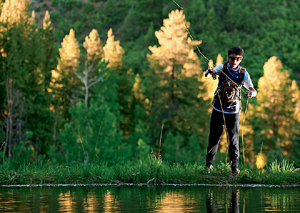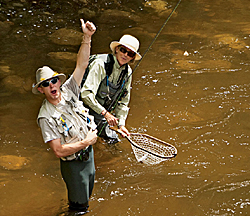sierraclub.org - sierra magazine - september/october 2010 - camp woolly bugger
Fly-fishing and salvation
By Jeff Galbraith
Deep in the hubris of middle school peach fuzz and social class struggle, I was sent to a kids' fishing camp in the Puget Sound area during the cool early weeks of April. At the church camp's lakeside compound, the program was pretty straightforward: Jesus and worms. We would arise to a full military-style barking and report for breakfast at 0500 hours. By 0600, the dockside fish slaying would commence.
 Domenic DiGregorio executes a cast with skill beyond his years.| Tim Romano
Domenic DiGregorio executes a cast with skill beyond his years.| Tim Romano
Given my still-pungent recollections of dank cabins and long rants on sin and salvation, I have reservations about my invitation to Trout Unlimited's 2010 River Conservation and Fly-Fishing Youth Camp in Woody Creek, Colorado. But an unusually lashing spring in the Pacific Northwest does give Colorado a certain appeal. And I arrive in Aspen to find that my version of trout camp 2010 involves a condo, down comforters, and an iPhone awakening set to a marimba tone. Hold the musty reveille and Blackwater antics, thank you.
The next morning, photographer Tim Romano and I roll down-valley in radiant Rocky Mountain sunlight, past the classic cabins and faux-rustic homes of the toxic-asset manager class, and head up a side-canyon road, eventually coming to rest before the estate gates of Beaver Run Ranch. An affable gentleman (more maintenance manager than toxic-asset manager) swings wide the doors, revealing an odd blend of American West worship—manicured lawns, fountains, and a diorama consisting of a chuck wagon and a plaque with the "Pioneer Creed": "The weak died along the way and the cowards never started." The private grounds are quiet, but farther out we hear the unmistakable soft bleatings of teenage stoke. A dozen-odd tents dot the campgrounds adjacent to the creek, while two-foot-long rainbows cruise a large trout pond like Trident submarines. This is already way better than Jesus-and-worm camp.
Sharon Lance, a Trout Unlimited volunteer and camp "mentor," greets us warmly before leading us to meet the campers, 15 boys and 2 girls ages 14 to 18. For the past five years, Colorado's TU chapters have sponsored kids from their areas, so there's no out-of-pocket costs for the parents. Each camper receives a week of instruction in stream ecology and stewardship, casting, fly-tying, and the etiquette of fly-fishing. In conjunction with TU and Temple Fork Outfitters, the Sierra Club has donated rods and reels to this and 16 other TU youth conservation camps. In a world where fewer and fewer teens can tell the difference between a bull trout and a bullhead, it's a small step in the right direction.

From left: Lori Nicholson and Sammy Hoag use a three-handed casting technique. Rainbow trout are a benchmark of a healthy stream. Brett Ferraro, Eli Perez, Cody Bergdorff, Sammy Hoag, and Taila Oulton take part in a streamside water-rights exercise.| Tim Romano
We slap together lunches and hit the road—although not to fish, as raging spring runoff has created an unfishable and somewhat hazardous situation on the creek. Instead, we're off to a U.S. Forest Service trail cleanup above the Frying Pan River's Ruedi Reservoir. Given this decidedly nonfishing activity, puberty-brain short-circuitry, and the actual labor involved in trudging uphill and pruning deadwood snags, I fully expect this core sample of Facebook Nation to begin breaking down within a few hundred yards. But a funny thing happens on the trail to dysfunction. No one whines or complains in the least; no one bitches about not fishing, the heat, or anything. In fact, the kids break into teams and take a discernible pride in cleaning their trail sections to the fullest.
 Sam Goldstein and mentor Sharon Lance above Ruedi Reservoir.| Tim Romano
Sam Goldstein and mentor Sharon Lance above Ruedi Reservoir.| Tim Romano
The banter, however, remains classic teenage wasteland with flashes of insane narrative genius. One young man pauses for a moment with his shears, staring intently at the protruding shrubs, and quips, "I wish these trees were emo, so they would just cut themselves." Later, another fellow announces, "Yeah, I brew moonshine." Although it seems inappropriate to ask if he is currently packing, the fact that he is scratching his eyebrow with the business end of his pruning shears recalls the whole brain short-circuitry thing. I ask him politely what he uses for mash. "Um, you know, whiskey stuff." Indeed. We go back to pruning.
Teen posturing mixed with equal parts summer alpine air and sweat equity on public land seems like an entirely healthy way to spend the day, but I repeatedly have to explain to the apologetic TU folk that the lack of fishing is fine. If anything, it seems like a good lesson in stream dynamics: Spring runoff is like a bowl of bran for streams, scouring out the detritus of winter. And just getting this small tribe of kids outdoors and away from their monitors/mobiles/gaming consoles for more than a couple of hours seems like a victory worth celebrating.
We return to the trout ranch, past aspen hollows and the torrent of Woody Creek, to catch a streamside presentation by TU lawyer Mely Whiting on Colorado water rights and their attendant effects on fish populations. She stretches a length of rope along the stream and hands out laminated cards: water drops in green, blue, and brown, and fish in green and red. Then she assigns roles: You are the water commissioner; you are the farmers; you are the Colorado Water Conservation Board; you people are the town; you are a fish with in-stream water rights; you are a fish with no rights. After a brief explanation of water-share assignments in Colorado (basically, it's first come, first served, but with agricultural interests usually trumping townships, and fish the most "junior" of all), the game begins.
It starts with the requisite teen smart-assedness—in response to the suggested concept of shared rights, one kid pipes up, "Sharing is for communists and kindergartners." But in short order all are deliberating water-share trades and reservoir releases in an earnest effort to equitably distribute water and maintain fish populations. This takes place in a matter of minutes and in a manner that would be a model of civility and efficiency for any water-district meeting.
Following the streamside session and back in the maintenance shop/classroom/fly-tying lab, things take a turn toward communism and kindergarten when one camper assesses the exercise, saying, "It seems like you shouldn't buy and sell something that is a common resource." Regarding the water challenges facing his state's growing municipalities, Gus Forrest, a 16-year-old from Nederland, notes, "If something went terribly wrong, the cities could be in big trouble." In less than a half hour, these kids have grasped the basics of the Mulholland-izing of the American West.
After dinner some of the mentors lead the campers in a fly-tying lesson, whipping up San Juan worms and woolly buggers for the following day, which threatens to include actual fishing.
Given the runoff conditions on Woody Creek, the Roaring Fork Club (a quasi-country club with prime access to its namesake river) has graciously welcomed the kids onto its exclusive grounds for the day. ("I've been waiting to fish this property since I was 15," confides one mentor in her forties.) Envisioning shaded, crystal clear pools with wary native trout, we instead find ourselves confronted with a muddy golf course water hazard. Yet considering the flat-out torrent of mud and hell that is the Roaring Fork, the pond seems epic.
Having forgone the group breakfast, I'd also managed to miss the briefing on the club's rules for the day: Kids only, no grown-ups poaching the ponds—which explains the stink-eyes as I gear my three-weight and cast to the occasional rolling boil.
After a few hot hours, several campers successfully land trout, surviving heatstroke in their not-really-necessary neoprene chest waders. Actually, they are so stoked that they could be wrapped up in wool blankets and stuck in a sauna and it wouldn't matter. Says Brett Ferraro, 14, of Avon, who catches his second fish of the trip at the golf course pond, "I learned to fly-fish, how to tie—the whole thing. I am going to get gear when I get home, for sure." He talks quickly, keeping an eye on the water. His buddy ties into one, and Brett dispatches with the small talk: "Yeah, cool—oh, he's got one. Gotta go!"
Eventually, all huddle in the available shade and eat lunch, before making a break way up the Frying Pan at the inflow end of Ruedi Reservoir. The wind is howling, and campers gamely try to double-haul cast into the bluster. Finally, someone mentions that the bridge above the inflow stream might be fishable. A few of the more accomplished kids head up there, returning a short while later with a victorious report. Soon many of the campers are casting to the edges of a swift current, dropping bead-headed nymphs into the eddying waters. As the indicators (the fly-fishing version of bobbers) jerk under and each camper takes turns reeling in a dozen or so fish, instruction and inspiration fuse, and it is difficult to tell who is more fired up—the mentors or the mentored.
Across the stream, under a cottonwood sapling and Mark Lance's tutelage, one very intent young gentleman keeps missing strikes and soon begins to smolder with frustration. Then, with a yelp of unfettered joy, he hooks the fish. More important, the fish have hooked him.
JEFF GALBRAITH is the publisher of the Flyfish Journal, the Ski Journal, and frequency: The Snowboarder's Journal. He rides, skis, hunts, and fishes in Whatcom County, Washington. This story was funded by the Sierra Club's Water Sentinels program. For information on Trout Unlimited's camps for 2011, go to tu.org.